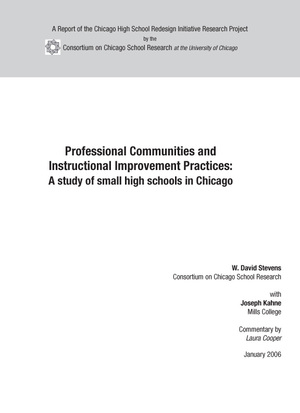1. How and when do teachers in small schools focus on instruction within their professional communities?
2. What resources for instructional improvement do teachers receive from their professional communities?
3. What factors support and constrain teachers’ instructional improvement activities?
4. How does the small school context shape instructional improvement activities in professional communities?
This qualitative study, which includes interviews with principals and teachers and observations of professional development activities, teacher team meetings, and technical support consultations, concludes that the work of teacher professional communities can be divided into two categories. The supportive practices of teacher teams are related to achieving the daily tasks required of individual teachers, such as addressing students’ behavioral and learning problems. Developmental practices are related to improving instruction and curriculum school wide, and include planning, implementing, and monitoring interventions geared toward improving student performance.
The authors of this study conducted almost 60 interviews with teachers and approximately 50 observations of teacher team meetings and other professional development activities. The observations and interviews revealed that teachers primarily engage in supportive, rather than developmental practices. Teachers explained that heavy workloads often prevented them from devoting more time to developmental practices.
In one school, however, teacher teams did have frequent discussions of improving standards-based instruction at the school. Most teachers credited the principal and lead teacher with leading and organizing the activities. The report authors point out that even though small schools are organized to encourage teacher collaboration, effective work related to across-the-board instructional improvement probably will not occur spontaneously. Developmental practices need to be initiated and organized by teacher leaders or principals.

